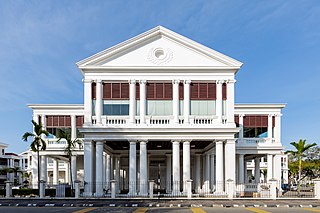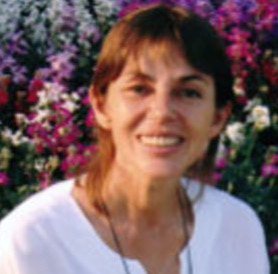Related Research Articles

Dato' Seri Utama Karpal Singh s/o Ram Singh Deo was an Indian Malaysian politician and lawyer. He was Member of Parliament (MP) for the constituency of Bukit Gelugor in the state of Penang from 2004 to 2014. During that time, he was also the National Chairman of the Democratic Action Party (DAP).

Wan Azizah binti Wan Ismail is a Malaysian politician who has served as Spouse of the Prime Minister of Malaysia as the wife of Anwar Ibrahim, Member of Parliament (MP) for Bandar Tun Razak since November 2022 and 1st President of the Pakatan Harapan (PH) coalition since July 2017. She served as the 12th Deputy Prime Minister and Minister of Women, Family and Community Development in the PH administration under former Prime Minister Mahathir Mohamad from May 2018 to the collapse of the PH administration in February 2020, 1st President of the People's Justice Party (PKR) from April 1999 to November 2018, the 11th and 13th Leader of the Opposition from March 2008 to August 2008 and again from May 2015 to May 2018, MP for Pandan from May 2018 to November 2022, for Permatang Pauh from November 1999 to March 2008 and again from May 2015 to May 2018 as well as Member of the Selangor State Legislative Assembly (MLA) for Kajang from April 2014 to May 2018. She was the first female Deputy Prime Minister and Leader of the Opposition as well as the highest ever female political officeholder in the history of Malaysia. She joined politics and held a number of political offices on behalf of her husband Anwar to retain his political influence during his absence from politics due to a series of his sodomy trials and prison sentences that had prevented him from holding the offices. She most notably served as the 1st President of PKR from the party formation to officially handing over the party leadership to Anwar after his release from prison while Anwar served as the "de facto" leader during the period.
The Bali Nine were a group of nine Australians convicted for attempting to smuggle 8.3 kg (18 lb) of heroin out of Indonesia in April 2005. The heroin was valued at around A$4 million and was bound for Australia. Ringleaders Andrew Chan and Myuran Sukumaran were sentenced to death and executed on 29 April 2015. Six other members, Si Yi Chen, Michael Czugaj, Tan Duc Thanh Nguyen, Matthew Norman, Scott Rush and Martin Stephens, were sentenced to life imprisonment and another, Renae Lawrence, to a 20-year sentence but was released after the sentence was commuted in November 2018. The Indonesian authorities reported on 5 June 2018 that Tan Duc Thanh Nguyen had died of stomach cancer.

The Barlow and Chambers executions were the hangings on 7 July 1986 by Malaysia of two Westerners, Kevin John Barlow and Brian Geoffrey Shergold Chambers (Australian) of Perth, Western Australia, for transporting 141.9 g (5.01 oz) of heroin.

Capital punishment in Singapore is a legal penalty. Executions in Singapore are carried out by long drop hanging, and usually take place at dawn. Thirty-three offences—including murder, drug trafficking, terrorism, use of firearms and kidnapping—warrant the death penalty under Singapore law.

Myuran Sukumaran was an Australian who was convicted in Indonesia of drug trafficking as a member of the Bali Nine. In 2005, Sukumaran was arrested in a room at the Melasti Hotel in Kuta with eight others. Police found 334 g (11.8 oz) of heroin in a suitcase in the room. According to court testimonies of convicted drug mules, Sukumaran and Andrew Chan were the co-ringleaders of the heroin-smuggling operation from Indonesia to Australia. After a criminal trial, Sukumaran was sentenced on 14 February 2006 by the Denpasar District Court to execution by firing squad.

Andrew Chan (Chinese: 陳子維; Jyutping: Can4 Zi2 Wai4; 12 January 1984 – 29 April 2015) was an Australian man who was convicted and executed in Indonesia for drug trafficking as a member of the Bali Nine. In 2005, Chan was arrested at Ngurah Rai International Airport in Denpasar. According to court testimonies of convicted drug mules, Chan and Myuran Sukumaran were the co-ringleaders of the heroin smuggling operation from Indonesia to Australia. After a criminal trial on 14 February 2006, Chan was sentenced to execution by firing squad by the Denpasar District Court.
Capital punishment is a legal penalty in Malaysian law.
Choo Han Teck is a Singaporean judge of the Supreme Court. He was formerly a lawyer before his appointment to the court as a judge. It was revealed in 2021 that Choo was one of the defence lawyers representing Adrian Lim, the infamous Toa Payoh child killer who was executed in 1988 for charges of murdering a girl and boy as ritual sacrifices. In 1994, Choo also defended Phua Soy Boon, a jobless Singaporean who was hanged in 1995 for killing a moneylender.

Van Tuong Nguyen, baptised Caleb, was an Australian from Melbourne, Victoria convicted of drug trafficking in Singapore. A Vietnamese Australian, he was also addressed as Nguyen Tuong-van (阮祥雲) in the Singaporean media, his name in Vietnamese custom, as well as in most Asian customs.
Kajang Prison is a prison located in Sungai Jelok, Selangor, Malaysia.
Informal admissions in South African law are part of the South African law of evidence. Briefly, an admission is a statement made by a party, in civil or criminal proceedings, which is adverse to that party's case. Informal admissions, which are usually made out of court, must be distinguished from formal admissions, made in the pleadings or in court. Formal admissions are binding on the maker, and are generally made in order to reduce the number of issues before the court; an informal admission is merely an item of evidence that can be contradicted or explained away.

Sanisvara Nethaji Rayer s/o Rajaji Rayer(Tamil: ஆர். எஸ். என். ராயர்) is a Malaysian politician and lawyer who has served as the Member of Parliament (MP) for Jelutong since May 2018. He served as Member of the Penang State Legislative Assembly (MLA) for Seri Delima from March 2008 to May 2018. He is a member of the Democratic Action Party (DAP), a component party of the Pakatan Harapan (PH) and formerly Pakatan Rakyat (PR) coalitions.He currently serves as the Chairman of the Penang Hindu Endowments Board.
Derrick Gregory was an English drug smuggler who was hanged in Malaysia in 1989.

The Penang High Court, founded in 1808, is the birthplace of Malaysia's judiciary system. It is housed inside a Palladian-style building at Light Street, George Town, Penang. To this day, the High Court sits at the top of Penang's hierarchy of courts.

Béatrice Saubin was a French woman convicted of drug smuggling in Malaysia who later wrote a best-selling book about her prison experiences. Raised by her grandmother in Romilly-sur-Seine, she dropped out of high school and travelled to Thailand, then Malaysia, having affairs with men in each country. Her Malaysian lover in Penang offered to marry her if she met him in Zürich. At age 20, in January 1980, she was detained at Penang International Airport when an airport x-ray scanner detected 534 grams (1.177 lb) of pure grade heroin hidden in her suitcase.

Tengku Maimun binti Tuan Mat is a Malaysian lawyer who has served as the 10th Chief Justice of Malaysia since May 2019. She is the first woman to ascend to the highest judicial office of the country.

Nagaenthran a/l K. Dharmalingam was a Malaysian drug trafficker who was convicted of trafficking 42.72 grams of heroin in April 2009 upon entering Singapore from Malaysia at Woodlands Checkpoint with a bundle of heroin strapped to his thigh. Nagaenthran confessed to committing the crime, but gave statements claiming that he was ordered to commit the crime out of duress by a mastermind who assaulted him and threatened to kill his girlfriend and his family. He also claimed he did so to get money to pay off his debts before he later denied any knowledge of the contents of his bundle.

Lau Chi Sing was a 23 year old male Hong Kong national executed in Singapore for drug trafficking. He was the first Hongkonger to be executed in Singapore since its independence and also the first drug mule to be sentenced to death for trafficking narcotics via Changi Airport.

S v Thebus and Another is a 2003 decision of the Constitutional Court of South Africa in the area of criminal law and criminal procedure. The court unanimously affirmed that the doctrine of common purpose was compatible with the Constitution, upholding two murder convictions on that basis. However, the court was also called to determine whether it is compatible with the constitutional right to silence for courts to draw an adverse inference from a criminal defendant's failure to disclose an alibi before trial. On that further question, the court was divided.
References
- ↑ "No way out." Sydney Morning Herald . 29 October 2005. Retrieved 14 September 2015.
- 1 2 Palmer, Tim. "Drug smuggler Michael McAuliffe hanged in Malaysia in 1993." ABC News Australia. See point 1:39. Updated 11 March 2015.
- ↑ "Macabre legacy in the hangman's craft". news.com.au. Archived from the original on 15 January 2006. Retrieved 10 March 2008.
- ↑ "Australian drug runner faces death". news.com.au. Archived from the original on 21 June 2006. Retrieved 10 March 2008.
- 1 2 Upheld: Death sentence on former Australian bartender. New Straits Times : 13 May 1992, p.5.